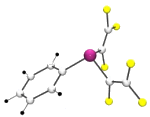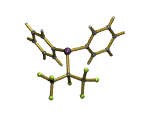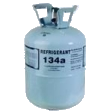Fluorine Chemistry Research
The main interest of Alan Brisdon's research group concerns the chemistry of fluorine and its compounds.
Fluorine Chemistry underpins all of our research work
Fluorine is one of the most reactive elements in the periodic table yet some of its compounds are the most stable and least reactive! Others are even more reactive than fluorine itself! It is the ability of fluorine to drastically alter the steric and electronic properties of its compounds that fascinates us.
Compounds of fluorine find applications in almost all areas of modern life. From fluoride in modern toothpaste to the many different fluorinated plastics and materials, including polytetrafluoroethene, PTFE (tradename Teflon) which is the inert plastic used in "non-stick" pans. Very many modern pharmaceutical compounds (anti-cancer, antibiotics, anti-malerial etc) include fluorine, or fluorinated groups. Fluorine is also heavily involved in environmental chemistry, for example the generation of hydrofluorocarbons (HFCs) has resulted in the rapid phaseout of their ozone-depleting cousins, CFCs.
Research Overview
Our research crosses the traditional inorganic and
organic borders, some of it is curiousity driven and some has
industrially relevance. Our main areas of research include the
chemistry of HFCs, fluorophosphines,
organofluorine compounds of main-group
and transition metal elements applications of
fluorinated
materials, such as ionic liquids and fluorographene, and spectroscopy.
Publications
We have published in areas ranging from CFC-related compounds,
HFCs, organofluorine chemistry, fluorovinyls, fluoroalkynes,
N-F compounds, fluorine-containing phosphorus ligands, fluoro-organometallic
systems, metal-based catalysis,
high-oxidation metal fluorides, coordination chemistry and ionic liquids.
Research
Facilities
Details about the School of Chemistry and our laboratory facilities.
Research Tools
Software to calculate 31P NMR chemical shifts, mass spec patterns and
elemental analysis figures. Also access our database of fluorine-containing
compound information.
The group, past &
present
Details of current and former final year project students, MSc, PhD researchers
and visiting academics. Also how to join us.





